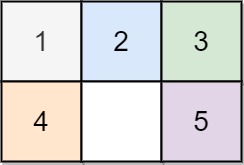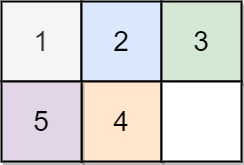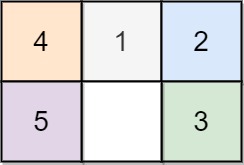LeetCode in Kotlin
773. Sliding Puzzle
Hard
On an 2 x 3 board, there are five tiles labeled from 1 to 5, and an empty square represented by 0. A move consists of choosing 0 and a 4-directionally adjacent number and swapping it.
The state of the board is solved if and only if the board is [[1,2,3],[4,5,0]].
Given the puzzle board board, return the least number of moves required so that the state of the board is solved. If it is impossible for the state of the board to be solved, return -1.
Example 1:

Input: board = [[1,2,3],[4,0,5]]
Output: 1
Explanation: Swap the 0 and the 5 in one move.
Example 2:

Input: board = [[1,2,3],[5,4,0]]
Output: -1
Explanation: No number of moves will make the board solved.
Example 3:

Input: board = [[4,1,2],[5,0,3]]
Output: 5
Explanation: 5 is the smallest number of moves that solves the board. An example path: After move 0: [[4,1,2],[5,0,3]] After move 1: [[4,1,2],[0,5,3]] After move 2: [[0,1,2],[4,5,3]] After move 3: [[1,0,2],[4,5,3]] After move 4: [[1,2,0],[4,5,3]] After move 5: [[1,2,3],[4,5,0]]
Constraints:
board.length == 2board[i].length == 30 <= board[i][j] <= 5- Each value
board[i][j]is unique.
Solution
import java.util.LinkedList
import java.util.Queue
class Solution {
private class Node(var board: String, var depth: Int, var y: Int, var x: Int)
fun slidingPuzzle(board: Array<IntArray>): Int {
val targetStr = "123450"
val sb = StringBuilder()
var y = 0
var x = 0
for (i in board.indices) {
for (j in board[0].indices) {
if (board[i][j] == 0) {
y = i
x = j
}
sb.append(board[i][j])
}
}
val seen: MutableSet<String> = HashSet()
val q: Queue<Node> = LinkedList()
q.add(Node(sb.toString(), 0, y, x))
val dir = arrayOf(intArrayOf(1, 0), intArrayOf(-1, 0), intArrayOf(0, 1), intArrayOf(0, -1))
while (q.isNotEmpty()) {
val next = q.poll()
val s = next.board
if (!seen.contains(s)) {
if (s == targetStr) {
return next.depth
}
val nextDepth = next.depth + 1
y = next.y
x = next.x
for (vector in dir) {
val nextY = y + vector[0]
val nextX = x + vector[1]
if (0 <= nextY && nextY < board.size && 0 <= nextX && nextX < board[0].size) {
val newBoard = swap(s, y, x, nextY, nextX)
q.add(Node(newBoard, nextDepth, nextY, nextX))
}
}
seen.add(s)
}
}
return -1
}
private fun swap(board: String, y1: Int, x1: Int, y2: Int, x2: Int): String {
val arr = board.toCharArray()
val t = board[y1 * 3 + x1]
arr[y1 * 3 + x1] = board[y2 * 3 + x2]
arr[y2 * 3 + x2] = t
return String(arr)
}
}

